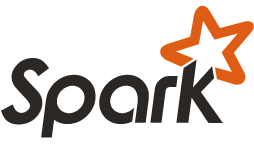Machine Learning Library (MLlib) Guide
MLlib is Spark’s machine learning (ML) library. Its goal is to make practical machine learning scalable and easy. It consists of common learning algorithms and utilities, including classification, regression, clustering, collaborative filtering, dimensionality reduction, as well as lower-level optimization primitives and higher-level pipeline APIs.
It divides into two packages:
spark.mllibcontains the original API built on top of RDDs.spark.mlprovides higher-level API built on top of DataFrames for constructing ML pipelines.
Using spark.ml is recommended because with DataFrames the API is more versatile and flexible.
But we will keep supporting spark.mllib along with the development of spark.ml.
Users should be comfortable using spark.mllib features and expect more features coming.
Developers should contribute new algorithms to spark.ml if they fit the ML pipeline concept well,
e.g., feature extractors and transformers.
We list major functionality from both below, with links to detailed guides.
spark.mllib: data types, algorithms, and utilities
- Data types
- Basic statistics
- Classification and regression
- Collaborative filtering
- Clustering
- Dimensionality reduction
- Feature extraction and transformation
- Frequent pattern mining
- Evaluation metrics
- PMML model export
- Optimization (developer)
spark.ml: high-level APIs for ML pipelines
- Overview: estimators, transformers and pipelines
- Extracting, transforming and selecting features
- Classification and regression
- Clustering
- Advanced topics
Some techniques are not available yet in spark.ml, most notably dimensionality reduction
Users can seamlessly combine the implementation of these techniques found in spark.mllib with the rest of the algorithms found in spark.ml.
Dependencies
MLlib uses the linear algebra package Breeze, which depends on netlib-java for optimised numerical processing. If natives libraries1 are not available at runtime, you will see a warning message and a pure JVM implementation will be used instead.
Due to licensing issues with runtime proprietary binaries, we do not include netlib-java’s native
proxies by default.
To configure netlib-java / Breeze to use system optimised binaries, include
com.github.fommil.netlib:all:1.1.2 (or build Spark with -Pnetlib-lgpl) as a dependency of your
project and read the netlib-java documentation for your
platform’s additional installation instructions.
To use MLlib in Python, you will need NumPy version 1.4 or newer.
Migration guide
MLlib is under active development.
The APIs marked Experimental/DeveloperApi may change in future releases,
and the migration guide below will explain all changes between releases.
From 1.5 to 1.6
There are no breaking API changes in the spark.mllib or spark.ml packages, but there are
deprecations and changes of behavior.
Deprecations:
- SPARK-11358:
In
spark.mllib.clustering.KMeans, therunsparameter has been deprecated. - SPARK-10592:
In
spark.ml.classification.LogisticRegressionModelandspark.ml.regression.LinearRegressionModel, theweightsfield has been deprecated in favor of the new namecoefficients. This helps disambiguate from instance (row) “weights” given to algorithms.
Changes of behavior:
- SPARK-7770:
spark.mllib.tree.GradientBoostedTrees:validationTolhas changed semantics in 1.6. Previously, it was a threshold for absolute change in error. Now, it resembles the behavior ofGradientDescent’sconvergenceTol: For large errors, it uses relative error (relative to the previous error); for small errors (< 0.01), it uses absolute error. - SPARK-11069:
spark.ml.feature.RegexTokenizer: Previously, it did not convert strings to lowercase before tokenizing. Now, it converts to lowercase by default, with an option not to. This matches the behavior of the simplerTokenizertransformer.
Previous Spark versions
Earlier migration guides are archived on this page.
-
To learn more about the benefits and background of system optimised natives, you may wish to watch Sam Halliday’s ScalaX talk on High Performance Linear Algebra in Scala. ↩
